Opinion: A quiet warrior in a lifelong fight

CAMPAIGNER: Gavin Nicol and his daughter, Katrina, who travels with him on his visits to veterans. File photo
.
■ Vietnam veteran Gavin Nicol may have once hitchhiked to Whakatāne to support fellow servicemen, but his decades-long advocacy for Aotearoa’s veterans has taken him much further. Kim Webby shares the story of an unsung hero whose service never stopped – and whose quiet determination has changed lives across the country.

A year or so ago I heard about an elderly man hitchhiking between Ōpōtiki and Whakatāne.
Gavin Nicol, now almost 79 years old, was on route to the Whakatāne RSA where he was a district support adviser for veterans, a role he continues today as a volunteer.
He is a Vietnam veteran himself, who supports and advocates for other veterans.
A car accident, due to health issues likely caused by Agent Orange exposure, means he no longer drives.
He hitchhiked to Whakatāne “quite a few times” because he wanted to arrive earlier than the bus could get him to work.
Mr Nicol is an unsung hero of Ōpōtiki, and indeed, the nation.
He, along with other Bay of Plenty veterans, are the voice, the advocates, and the friendly shoulder for returned servicemen.
They are also the flea in the ear of successive governments, Veterans Affairs and often the RSA itself, as they advocate for the welfare and wellbeing of veterans, from all wars.
For 40 years Mr Nicol, John Bluett, Victor Johnson, John Moller, Doug Belsham and Pam Miley-Terry have fought for veterans.
And no doubt, there are many others around the motu. Mr Nicol says they are a team, not just one person, and should all be recognised
According to Mr Nicol, “It doesn’t matter what happens to you, as long as you do something for somebody.”
An electrician and secondary school teacher, Mr Nicol, signed up to the army in 1969, and a year later, he was with Victor 5 Company at Nui Dat Base in Phuoc Tuy Province, Vietnam.

He witnessed Vietnamese military police beat a man to death. He never spoke of it until a decade later, when he realised that incident was probably the cause of his chronic anxiety or what we call today, PTSD.
“I’m no war hero,” he says. “I got a job at base due to my qualifications.”
But at base he was exposed to Agent Orange, assisting two other soldiers with ground spraying.
Mr Nicol’s job was to fill their metal, spray backpacks with Agent Orange and clear any rocks or trees away from the spray line.
Their protective clothing was lightweight, raincoats, suited to the tropical heat.
Before long he had chloracne, a painful skin condition caused by dioxins from Agent Orange. It creates pustules, cysts, nodules and swelling.
According to the World Health Organisation, dioxins are highly toxic and can cause reproductive and developmental problems, damage the immune system, interfere with hormones and cause cancer.
Later, Mr Nicol developed many of the 14 conditions associated with dioxin exposure, including Parkinson’s Disease, ischaemic heart disease and diabetes.
As with many veterans, his Agent Orange exposure is the likely cause of ill health in the next generation.
His daughter, Katrina, has spina-bifida and chronic kidney disease, not that it stops the energetic 50-year-old from being her father’s advocacy assistant.
She also travels with him on his many visits to veterans from Hokianga in Northland to well south of Ōpōtiki, including SH35.
The hardest job, says Mr Nicol, “is to see our old friends dying.
One or two have asked me to be with them, when they die.”
He has helped many veterans and their families to apply for financial help for health conditions that are now recognised by the Government, as caused by Agent Orange.
This recognition is because of the lobbying done by Mr Nicol and others. Up the coast and all around Aotearoa, there are new disability-supported bathrooms, kitchens and ramps.
Now Parkinson’s Disease is slowing down Mr Nicol, but he is still involved with the welfare of veterans including veterans of later wars, Afghanistan, Timor Leste and the conflict in the former Yugoslavia.
“I need to walk away, but they’re not getting the support they need,” he says.
Mr Nicol won’t like being singled out for attention, but he thoroughly deserves the recognition.
Ngā mihi mahana e te rangatira.